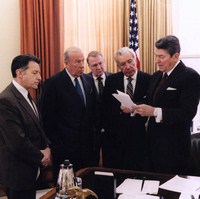Introduction: A Climate of Fear
Every democracy must wrestle with the dilemma of ensuring security for its citizens, while at the same time protecting their liberty and privacy. Since 1975, when the U.S. Senate’s Church Committee, led by Sen. Frank Church, investigated media revelations about domestic spying by the CIA, the United States, more than any other nation in history, has been attempting to find an effective response to this dilemma: a workable equilibrium between the activities of secret agencies, on one hand, and the proper measures of accountability necessary to prevent them from overstepping the boundaries of law and propriety, on the other.
In the crucible of fear, however, the Constitution takes on malleable proportions—or so some in high office seem to believe. In response to dangers, real or imagined, power can become concentrated in the hands of a few leaders. Yet this concentration of power is precisely what the founders of this nation cautioned against. James Madison and his colleagues who wrote the Constitution were, above all, anti-power in their perspectives.

